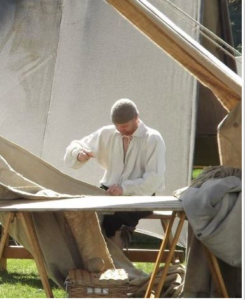 In the Bible, there are a group of Psalms known as the “Messianic Psalms” that are not only predictive of Jesus Christ but were also heavily quoted by the early Church. In fact, the Book of Psalms is quoted more in the New Testament than the remainder of the Old Testament. Jesus also stated that the psalms spoke about Him in Luke 24:44.
In the Bible, there are a group of Psalms known as the “Messianic Psalms” that are not only predictive of Jesus Christ but were also heavily quoted by the early Church. In fact, the Book of Psalms is quoted more in the New Testament than the remainder of the Old Testament. Jesus also stated that the psalms spoke about Him in Luke 24:44.
There are some today that have difficulty in reconciling the “One God” of the Old Testament with the three “Persons” of the New Testament Trinity. Why? Although we acknowledge that our God is singular we also know that the New Testament proclaims a three-person Godhead. But, the fact is we actually begin to see the “Trinity” first in the Old Testament and not the New, and this is not predicated upon speculation.
From the very first verse of Genesis we have the Hebrew word Elohim for “God” which is a plural noun used with a singular verb. We also see Elohim in Genesis 1:26, 3:22, and 11:7 in the same manner. If you examine Ecclesiastes 12:1 we learn that in the Hebrew text it is plural. In the English it reads “Remember now thy Creator in the days of thy youth…” But in the source text you will find it translates, “Remember now thy Creator(s) in the days of thy youth…”
There are other examples that can also be found in the Old Testament but I want to highlight a very unique portion of Scripture in which the voices of the Father, Son and Holy Spirit can clearly be seen in Psalm 2, one of the most provocative of the “Messianic Psalms.” There is also a “fourth” voice.
Let’s break this Psalm down in a sort of diagram whereby you will actually see four voices, including the trialogue of the Trinity:
Psalm 2
Voice of the Nations (verses 1-3)
1. “Why do the heathen rage, and the people imagine a vain thing?
2. The kings of the earth set themselves, and the ruler take counsel together, against the LORD, and against his anointed, saying,
3. Let us break their bands asunder, and cast away their cords from us.”
In these first three verses we have the world saying in effect, “we have no king but Caesar.” The “heathen” would be a reference to the Gentile nations and they align themselves against God. Note that the “rulers take counsel together” in this effort. “Anointed” in the Hebrew is “Messiah” and in the Greek translates as “Christ.” What are the “bands asunder” and “cords?” This would be God’s appointed order and examples of this would include the bonds of marriage, the Ten Commandments, and the rule of law, etc. The worst outcome in the modern world is not necessarily to break the law but to not have any laws! One day this will come to pass in a climactic ending and the Bible describes a “man of lawlessness” who will rule the world for a brief time.
Voice of the Father (verses 4-6)
4.”He that sitteth in the heavens shall laugh: the Lord shall have them in derision.
5. Then shall he speak unto them in his wrath, and vex them in his sore displeasure.
6..Yet have I set my king upon my holy hill of Zion.”
Here we find that God the Father shall laugh at this affront. The word “derision” means “contemptuous ridicule” or “mockery.” Furthermore, He will be provoked one day to anger which will lead to His wrath and which will bring great distress to the nations. Nonetheless, God the Father says that He will set “my king upon my holy hill of Zion.” This has not happened yet and can only be fulfilled when the Lord Jesus Christ will sit on the throne of David during His Millennial Reign on earth in Jerusalem. For the Bible tells us that Jesus first suffered for us as the Lamb of God but that He will one day return gloriously as our reigning King.
Voice of the Son (verses 7-9)
7.” I will declare the decree: the Lord hath said unto me, Thou art my Son; this day have I begotten thee.
8. Ask of me, and I shall give thee the heathen for thine inheritance, and the uttermost parts of the earth for they possession.
9. Thou shalt break them with a rod of iron; thou shalt dash them in pieces like a potter’s vessel.”
Jesus speaks what the Father has spoken. We are reminded that Jesus is the “only begotten Son” from John 3:16 and that at the Transfiguration God says, “This is My Son, whom I have chosen…” (Luke 9:35). Jesus is the Son of God and He will return for His church which was purchased by His shed blood for us on the cross. The Church is known as “the bride of Christ” and will be composed primarily of Gentiles. At His Second Coming Jesus will destroy the nations that are arrayed against Him with a “rod of iron” that is referenced in Revelation 2:27, 12:5, and 19:15-16.
Voice of the Spirit (verses 10-12)
10.”Be wise now therefore, O ye kings: be instructed, ye judges of the earth.
11. Serve the LORD with fear, and rejoice with trembling.
12. Kiss the Son, lest he be angry, and ye perish from the way, when his wrath is kindled but a little. Blessed are they that put their trust in him.”
The voice of the Holy Spirit says to the Mind in verse 10, “Be wise, and be instructed.” In verse 11 to the Heart, “serve Him.” And in verse 12 to the Will, “Kiss the Son!” and be reconciled by the Cross. It is clearly evident that here we have God the Father, God the Son, and God the Holy Spirit speaking in Psalm 2.
The crucifixion of Jesus Christ did not take God by surprise for it was prophesied long ago. Likewise, today we can be assured that God is sovereign and despite the chaos and insanity we see in the world today, He is in control. As Christian believers we are called into a “royal priesthood” and to bear witness to Jesus our Lord and we do not know what that may yet include. But be assured that as verse 12 reminds, “Blessed are they that put their trust in him.”
 It has been said that sound Biblical doctrine is obtained in much the same manner as making a quilt. Many years ago, I can remember my mother and grandmother laboring weeks and months over the design and sewing of a beautiful quilt. Here are some tips for quilt making: “Be precise to ensure points and seams match perfectly. Use tools wisely, especially when rotary cutting. You must cut correctly, sew accurately and press precisely.” One cannot help but recall that Paul was also a tentmaker and must have employed many of the same techniques.
It has been said that sound Biblical doctrine is obtained in much the same manner as making a quilt. Many years ago, I can remember my mother and grandmother laboring weeks and months over the design and sewing of a beautiful quilt. Here are some tips for quilt making: “Be precise to ensure points and seams match perfectly. Use tools wisely, especially when rotary cutting. You must cut correctly, sew accurately and press precisely.” One cannot help but recall that Paul was also a tentmaker and must have employed many of the same techniques. Here in the United States we rarely hear or use the term “widows and orphans.” But, in sub-Saharan Africa virtually everyone has widows and orphans in their lives. In Zambia alone it is estimated there are 1.4 million orphans living within a population of 16.5 million, or 8.5% of the total.
Here in the United States we rarely hear or use the term “widows and orphans.” But, in sub-Saharan Africa virtually everyone has widows and orphans in their lives. In Zambia alone it is estimated there are 1.4 million orphans living within a population of 16.5 million, or 8.5% of the total. “And he shall take the two goats, and present them before the LORD at the door of the tabernacle of the congregation.” (Leviticus 16:7)
“And he shall take the two goats, and present them before the LORD at the door of the tabernacle of the congregation.” (Leviticus 16:7)